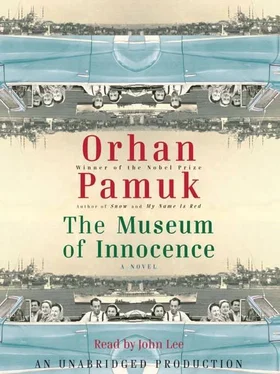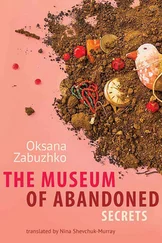It was her mother who answered the door.
“No, Aunt Nesibe, there’s no need for me to come up,” I said, reaching into my pocket. “This is for Füsun… It’s a present from my father. I thought I would drop it off on my way by.”
“Why don’t I make you a quick coffee, Kemal. There are a few things I’d like to tell you before Füsun gets back.”
She said this in such a furtive way that I relented and followed her up the stairs. The house was flooded with sunlight, Lemon the canary rattling about happily in his cage. I saw that Aunt Nesibe’s sewing things-her scissors, her pieces of cut cloth-were spread all over the room.
“Nowadays I never make house calls, but these people were so insistent I couldn’t say no, so we’re putting together an evening gown as a rush job. Füsun’s helping me, too. She should be back soon.”
She served me coffee and got straight to the point. “There have been needless heartbreaks, and silent recriminations-all this I understand,” she said. “Kemal Bey, she went through a lot of pain, my girl did. Her heart was very badly broken. You need to be patient with her moods, and indulge her…”
“Yes, of course,” I said, as if I did know all this.
“You know far better than I do how to do it. Indulge her, do what you think best, so that she can step off this wrong path she has taken.”
I gave her an inquiring look, hoping to learn what wrong path Füsun had taken; then I raised my eyebrows.
“Before you got engaged, and on the day of your engagement, and even after the engagement-for months and months, she suffered terribly-oh, how she cried,” she said. “She stopped eating, and drinking, she wouldn’t go out, she cut herself off from everything. This boy came to see her every day and tried to console her.”
“Do you mean Feridun?”
“Yes, but don’t worry. He knows nothing about you.”
She went on to explain that the girl was in such great pain and distress that she had no idea what she was doing, that Tarık Bey had been the first to propose the idea of marriage as a cure, and that in the end she had agreed to marrying off Füsun to “this child.” Feridun had known Füsun since she was fourteen. In those days he was madly in love with her, but Füsun had paid him no attention; she had almost destroyed him with her lack of interest. These days Feridun was not so much in love with Füsun-she raised her eyebrows slightly and smiled, as if saying, This is good news for you, too. Feridun was seldom at home in the evenings, being utterly immersed in the film world and preoccupied with his film-world friends. You might almost think that he had left his dormitory in Kadırga not to marry Füsun, but to be closer to the Beyoğlu cafés where his film friends waste their time. Of course, the two had eventually developed feelings for each other, as healthy young couples entering arranged marriages had always done in the past, but I was not to credit this overmuch. After the ordeal she had suffered, it had seemed only prudent to them that Füsun should marry at once, and so they had no regrets…
By their “ordeal,” she left me in no doubt that she was referring not to Füsun’s love for me, or the debacle of the university exam: It was clear from her eyes that the heart of the crisis was Füsun’s having slept with me before marriage, and now she took evident pleasure in holding me to account. Only by marrying at once could Füsun save herself from this stain, and, of course, I was responsible for this, too!
“We know-we all know-that Feridun has no real prospects, that he is in no position to give her a good life. But he’s Füsun’s husband!” said Aunt Nesibe. “He wants to make his wife a movie star. He’s an honest and well-meaning boy! If you love my daughter, you’ll help them. We thought it would be better to marry Füsun to Feridun than to some rich old goat who would look down on her because of her stained virtue. The boy will introduce her to film people. And you, Kemal, you can protect her.”
“Of course, Aunt Nesibe.”
If she knew that her mother had been spilling family secrets, Füsun would punish us severely (Aunt Nesibe smiled faintly, as if only slightly exaggerating). “Of course, Füsun was deeply affected by the news that you had broken off your engagement to Sibel, just as she was sorry to hear that you had suffered so much, Kemal. This film-loving boy she has married has a heart of gold, but it won’t be long before Füsun sees how inept he is, and when she does, she’ll leave him… Until then, you can be at her side, bolstering her confidence.”
“All I want, Aunt Nesibe, is to repair the damage I’ve done, the heartbreak. Please help me win Füsun back,” I said, taking out the box with my father’s earrings and giving it to her. “This is for Füsun,” I said.
“Thank you…” she said, and took the box.
“Aunt Nesibe… there’s something else… On the first night I came here, I brought back an earring of hers. But it never reached her hands. Do you know anything about this?”
“This is the first I’ve heard of it. You can give her your present yourself, if you want.”
“No, no… Anyway, that earring was not a present; it belongs to her.”
“Which earring?” asked Aunt Nesibe. When she saw that I was having trouble making up my mind, she said, “If only everything could be sorted out with a pair of earrings… When Füsun was feeling poorly, Feridun came to see us, too. When my daughter was so weak from sorrow that she could barely walk, he would take her by the arm and walk her all the way to Beyoğlu to see a film. Every evening, before he went off to the coffeehouse to see his film friends, he would come and sit with us, and eat with us, watch television with us, he paid Füsun such loving attention…”
“I can do a great deal more than that, Aunt Nesibe.”
“If God is willing, Kemal Bey. You are always welcome. Come any evening! Give my best to your mother, but please don’t cause her any upset.”
As she glanced at the door, so as to warn me that I needed to leave before Füsun caught me there, I left the house at once, feeling at peace as I walked up Çukurcuma Hill to Beyoğlu, freed from indignation, from pique of either kind.
FOR SEVEN years and ten months exactly I made regular visits to Çukurcuma for supper to see Füsun. If we bear in mind that my first visit was on Saturday, October 23, 1976-eleven days after Aunt Nesibe’s open-ended welcome (“Come any evening!”)-and that my last night in Çukurcuma with Füsun and Aunt Nesibe was on Sunday, August 26, 1984, we can see that there were 2,864 days intervening. According to my notes, during the 409 weeks that my story will now describe, I went there for supper 1,593 times. From this we can deduce that I went four times a week on average, but that does not mean I went there four times a week as a matter of course.
There were weeks when I saw them every day, and others when-growing indignant again and again convincing myself that I could forget Füsun-I stayed away. But never did more than ten days go by without Füsun (that is, without my seeing her), because after ten days I would be reduced to those levels of misery that I had endured during the autumn of 1975, which had precipitated the current regime, so it would be correct to say that I saw Füsun and her family (the Keskins) on a regular basis. They, for their part, expected me on a regular basis, and they could always guess when I was likely to turn up. However it happened, before long they had grown accustomed to seeing me at the supper table, as I had grown accustomed to the idea that they were expecting me.
The Keskins never needed to formally invite me to supper, because they always kept a place for me at the table. This provoked a great deal of hand-wringing on my part, when I was not altogether inclined to go and struggled over the decision. I sometimes thought that if I went one more time, I might be imposing on them; and if I didn’t go, I not only would face the pain of not seeing Füsun that evening, but might “cause offense” or succumb to fears that my absence might be taken amiss.
Читать дальше












